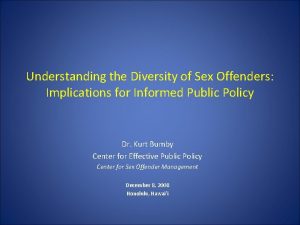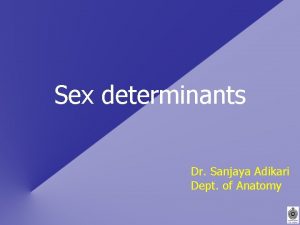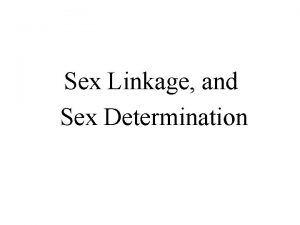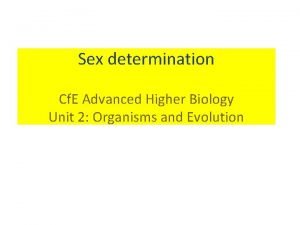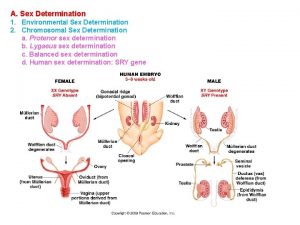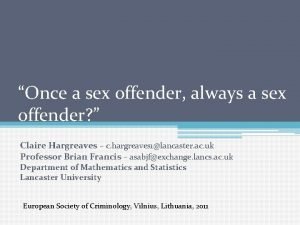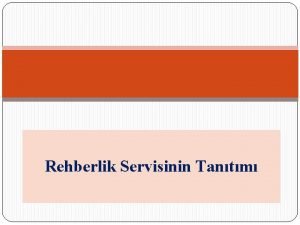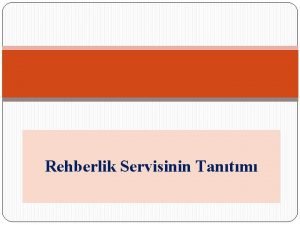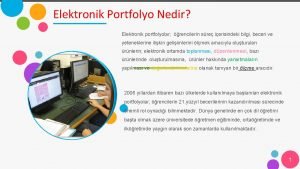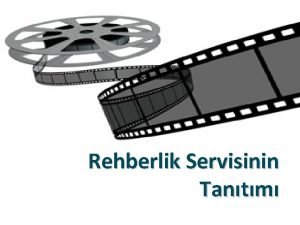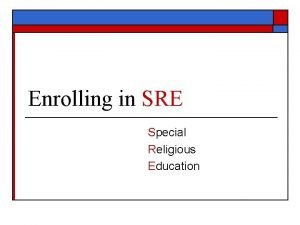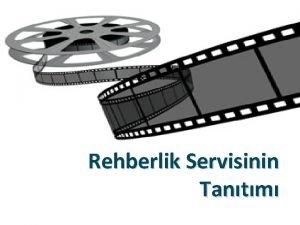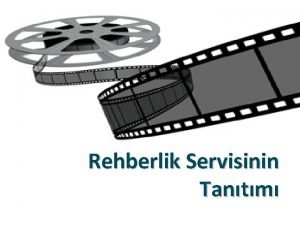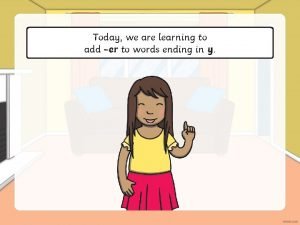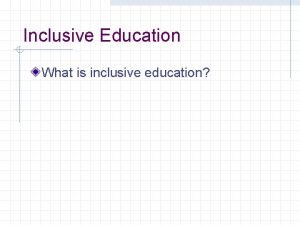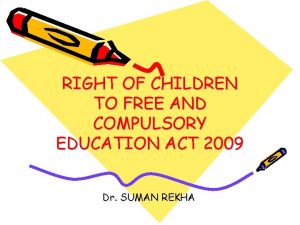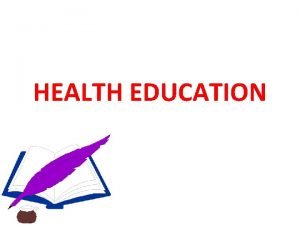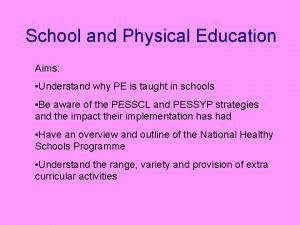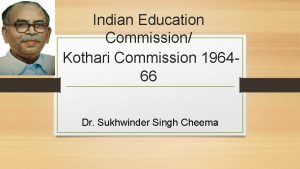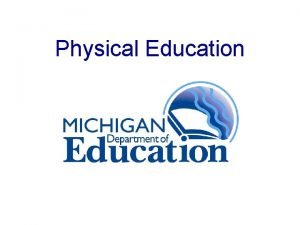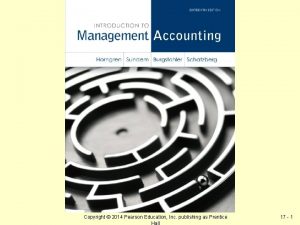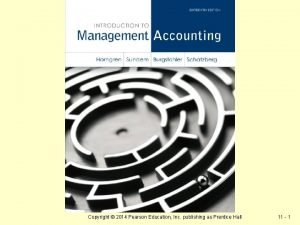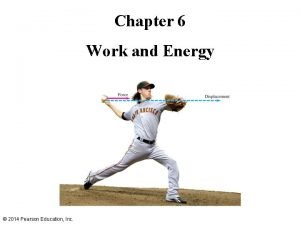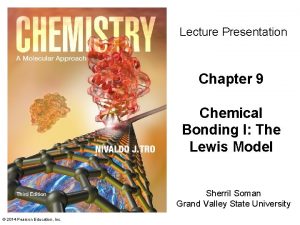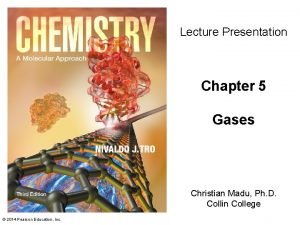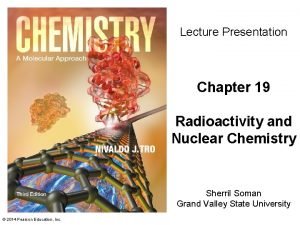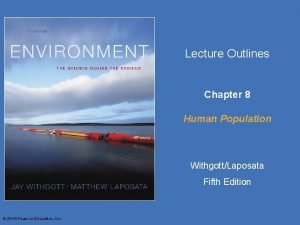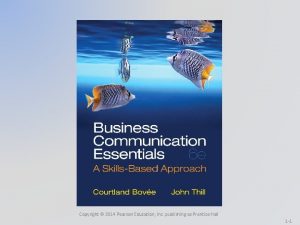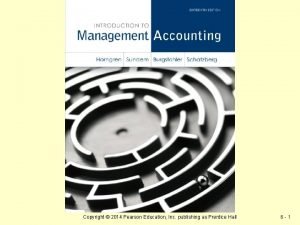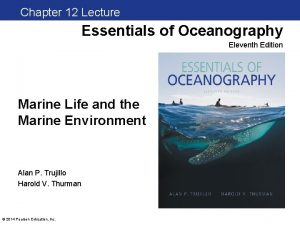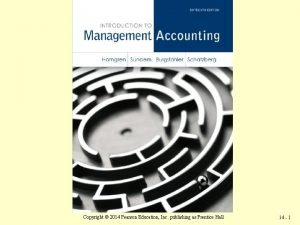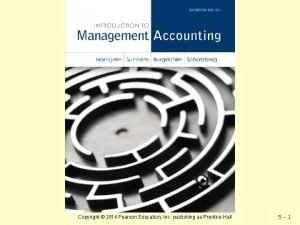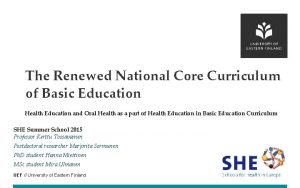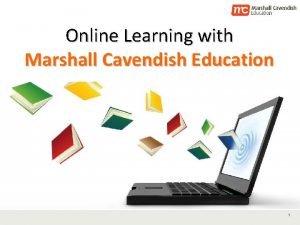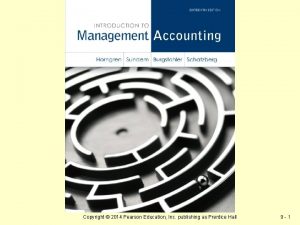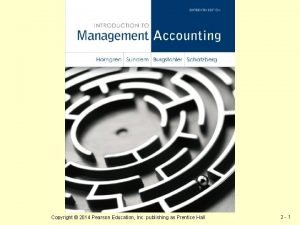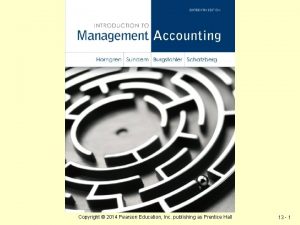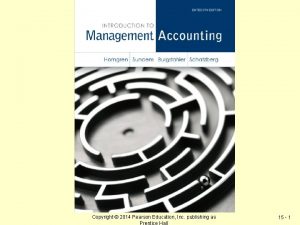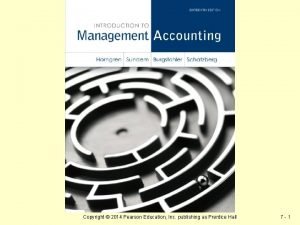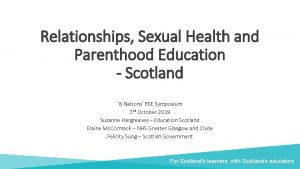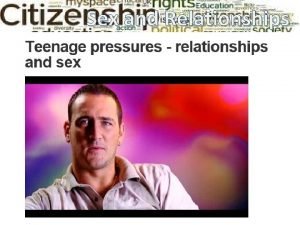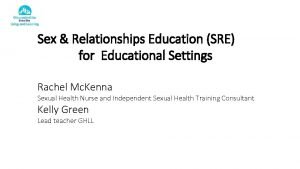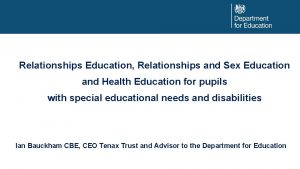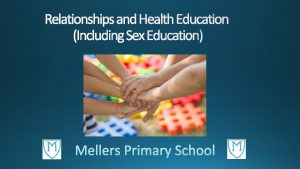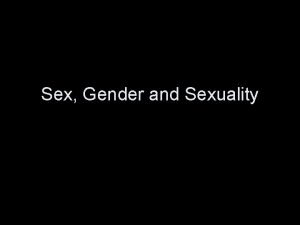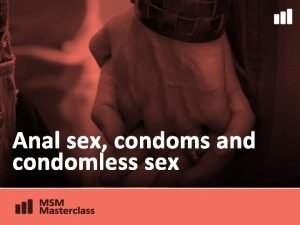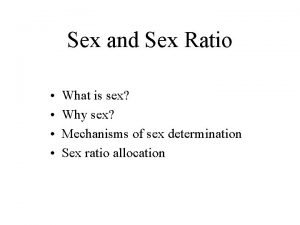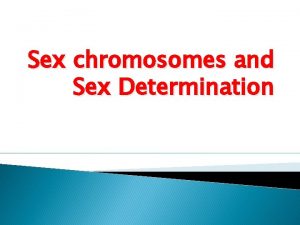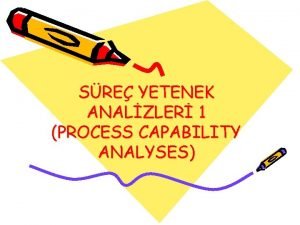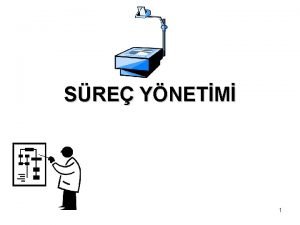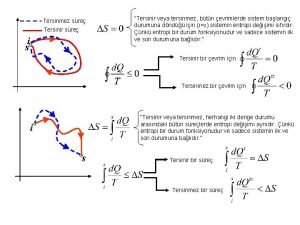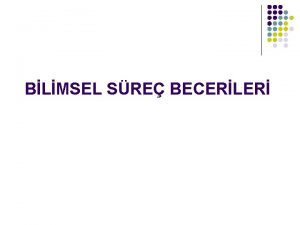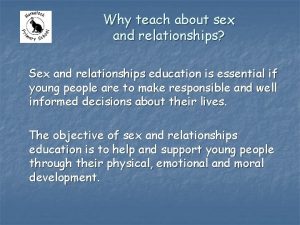Sex and Relationships Education SRE January 2014 Aims





























































- Slides: 61

Sex and Relationships Education (SRE) January 2014

Aims for the day n n n To reflect on what is both necessary and desirable to teach within PSHE and SRE Are what is necessary and desirable the same? In other words – what are we required to teach? To reflect on the importance of SRE (and PSHE generally) within the curriculum as a whole. To reflect on the centrality of staff To reflect on a core SRE curriculum.

Background n n On 23 rd October 2008 the Labour Government published it’s response to the Report by the SRE Review Steering Group, in which it announced its intention to make SRE statutory In April 2010 these plans were dropped in order to get various urgent legislation through before the May election As at December 2011, it is unclear what the Coalition Government’s policy on SRE is and what (if anything) it intends to change Schools still however, need to make provision for sufficient curriculum time.

The Sex Education Forum believes that SRE should be an integral part of lifelong learning n an entitlement for boys, girls; those who are heterosexual, lesbian, gay or bisexual; those with physical, learning or emotional difficulties; those with a religious or faith tradition n provided within an holistic context of emotional and social development. n

The Forum goes on to suggest that n 1. 2. 3. n there are three key elements to SRE Acquiring information Developing skills Exploring attitudes and values and warns that Information about sex alone can never be enough.

Some philosophical questions to answer n n Is it an inclusive entitlement for special needs pupils be taught the same as their main stream peers, or at least ‘as close to the functioning of their mainstream peers as possible’? Maddison (2002) pp 21 What should pupils with SLD be capable of understanding about SRE by the time they leave school? Can an SLD SRE curriculum reflect both? Should an SLD SRE curriculum reflect both?

Missing out on a shared sexual knowledge n n n ‘Socially’ shared sexual knowledge plateaus around the age of puberty but young people with LDs will probably not have attained the maturity of an average young adult, and they don’t have the same experiences They may be the victims of social asexualization where their sexuality is not recognised, as if their LD has eliminated the possibility of sexuality The oversexualization observed in some young people with LD can be viewed as a result of a lack of understanding of [1] social conventions and [2] the notion of consent.

n n n Parents, other adults and peers may be uncomfortable with the subject of sexuality, which can lead to further isolation in social situations These teenagers have ‘sexual needs’ that they attempt to express – but when they do their behaviours are often ‘punished’ This conflict can often lead to further inappropriate behaviours.

Case Study 1 - David n n n David is 18. He has ASD and is functioning at around Level 1/2 of the NC He has been telling you that he is having constant thoughts about women, and often masturbates in the shower at home. He always locks the door. He has also told his parents who have reacted very aversely. They have told him he will go to hell if he continues. He is VERY worried about this. What do you do?

Sex education and Autism What are the difficulties?

Possible/probable difficulties with Social Interaction n n n Lack of awareness of others Lack of interest in friendship Lack of interest in social inclusion or approval Lack of reciprocal social interaction Difficulty with emotional involvement Difficulty understanding directions Difficulty understanding jokes, nuances, word plays, innuendo.

Possible/probable difficulties with Communication n n Lack of motivation to communicate Limited ability to communicate in unstructured situations Communication limited to simple requests Inappropriate language – difficulties mapping language to task Difficulties understanding non-verbal communication.

Possible/probable difficulties with Flexibility of Thought n n May engage in very rigid routines or rituals which prevent the development of relationship skills May only be interested in their own special interests Limited appreciation of the feelings of others Lack of awareness of the motives of other people.

Other possible/probable difficulties n n Sensory issues – especially touch and being touched Lack of Theory of Mind – do we need empathy to have a successful relationship with another person Lack of Central Coherence – what are the most important things about finding and maintaining a relationship The not inconsequential matter of additional severe/moderate learning difficulties!!

Sex Education and Severe Learning Difficulties Communication difficulties n Poor concentration skills n Difficulties in learning from previous experience n Difficulties in generalising learning n Difficulties in repairing relationship breakdowns. n

Given these difficulties n What can we expect those working at: 1. P 4 and below 2. P 5 to P 8 3. Level 1 and above to learn within SRE by the time they leave school?

What do we have to teach? According to Ofsted

QCDA recognises that teachers should n Teach in ways that match and challenge their pupils’ abilities. Teachers can 1. Work within earlier key stages Maintain, reinforce, consolidate and generalise Focus on one or limited aspects of the age related Programme of Study Use everyday activities as a focus Work within accredited Schemes of Work such as ASDAN or Equals (QCA, 2003). 2. 3. 4. 5.

What do we have to teach? According to legislation?

All schools must provide an up to date policy that describes the content and organisation of SRE provided outside NC science n It is the school governors’ responsibility to ensure that the policy is developed and made available to parents/carers for inspection. n

Secondary schools are required to provide an SRE programme which includes (as a minimum) information about sexually transmitted infections and HIV/AIDS n Special schools may need to make separate arrangements (Df. ES, 2001). n

Parents n n Any parent may at any time, exercise their statutory right to withdraw their child under the Education Act 1993 from all or part of the sex education programme Except for the teaching of the biological aspects of human growth and reproduction necessary under National Curriculum Science Parents are however, an ESSENTIAL element whose contributions over time will directly shape their children’s’ education They need to be involved and be part of a tripartite educational experience.

Note the risks of teaching (i) (iii) dogmatically – that all areas will be taught or equally that only certain areas will be taught morally – that stances taken by students are either wrong or right –and in the abstract – particularly so for SLD learners.

Your school needs to make a philosophical decision which may well be related to what is likely n n n How many SLD, ASD, MLD students have formed/had sexual relations with others in the past? How many have had platonic relations in the past? How many are likely to enter into sexual relations in the immediate future (say 2 or 3 years from now or after leaving school)?

What we might need is n n n A core curriculum document that is flexible enough to teach according to individual need at any particular time One that is capable of revisiting and thereby strengthening previous learning One that is also capable of building on previous learning.

Case study 2 n n n Julie and Duncan are both 16 and have been close for some time. They are functioning around P 8 They’ve recently taken to holding hands and kissing each other hello and goodbye when they meet in the playground They both say they’re in love and want to get married They both say they want to have sex with each other Julie’s mother has formally complained to the head teacher that staff are encouraging immoral behaviour.

Role of staff Ann Craft (1994) Personal Relationships and Sexuality

Case study n n n Kerwin is 11 years old, has SLD and is functioning around P 5 He masturbates obsessively throughout the day He becomes confused and disorientated when stopped and can exhibit quite challenging and occasionally aggressive behaviour He will also attach himself physically to a person - using them to masturbate with At home Kerwin sleeps with his mother in her bed and masturbates in the bed at night, he also masturbates in front of his sisters When asked what strategies they use at home to deal with this behaviour mum said ‘I smack him on the hand – very hard’.

Looks at staff as Teachers n Counsellors n Protectors n Interveners n Empowerers n

Staff as teachers n n Staff need to be competent in, and feel comfortable with, setting up and running structured programmes covering SRE Will know the group AND have an understanding of their individual needs.

Staff as counsellors Irrespective of the structured programme on personal relationships, some individuals with learning difficulties will need individual or pair counselling about aspects of their lives n We may identify who these might be rather then leave it to chance n

Staff as protectors As a group, young people with learning difficulties are likely to have increased vulnerability to sexual abuse and sexual exploitation n Staff have a responsibility towards the personal integrity and safety of individuals with complex needs within their own institution. n

Staff as interveners n Where a particular sexual behaviour brings a person with a learning difficulty into conflict with legal boundaries and societal boundaries, it may be necessary for staff to intervene and re-direct the student away from a potentially complex situation.

Key Features are therefore Vital role played by staff n Self-realisation, self-expression and selfconfidence are at the centre of any formal or informal programme n Progress at students pace n ‘Guided’ decision making. n

Staff as Empowerers n Enabling the students by a process of encouragement, facilitation and the imparting of skills to exercise power over their own lives and to make their own choices at their own pace.

Case Study 3 n n n Sean is 10 years old, he has Downs syndrome and is operating at Level 1 of the NC Lately, Sean has been caught in the toilets watching students from other tutor groups changing their pads, and has been discovered in other classrooms taking pads out of cupboards He has been found at the urinal in the boys toilet with another student, both with their pants down touching his penis Recently whilst in a public swimming pool Sean disappeared for 10 minutes, only to be discovered in a cubicle with another boy [from his tutor group] who was naked Staff have also observed Sean in the toilet, with the cubicle door wide open playing with his penis on more than one occasion.

Base SRE Curriculum that applies to all

1. 2. 3. 4. 5. 6. Knowing my body Knowing me Private and public Touching and allowing others to touch me Forming relationships Sexual intimacy

Knowing my body n n n n n Body parts Their functions - what the parts do Age differences Gender differences Menstruation My clothes – on top and underneath Sexual feelings Masturbation Hygiene.

Knowing me n n n n What I like and what I don’t like Who I like and who I don’t like What I can do and what I can’t do Trusting somebody – who can I trust? Me, you and us Types of people in my life – friends, family, teachers, people in the community etc Developing a positive image and high self-esteem.

Private and public Where on my body is private? n Where on my body is not private? n Where can be by myself? n Where can I go to be private? n Where do I spend time with other people? n My room. n

Touching and allowing others to touch me Where on the body can I safely touch? n Where is it inappropriate to touch? n Public and private places n Gaining permission to touch n Resisting pressure and saying ‘no’ n Saying ‘yes’? n Making choices. n

Forming relationships What does a relationship mean? n Liking somebody and loving somebody n Dating n Having a girlfriend/boyfriend n Same sex relationships n Compliments n Sharing a special time or event. n

Sexual intimacy n n n Only taught to those who have demonstrated a sexual persona already The sexual act The recognition that tenderness, care and empathy are key components of any sexual act with another Safe sex The possible consequences of unsafe sex.

Key barriers to teaching SRE (Tissot, 2009) n n n n The nature of the learning difficulty Parents’ religious and cultural beliefs The difficulties in teaching a concrete concept of privacy The views and personal beliefs of the staff The law The challenges that will emerge by actually enabling sexual identity The beliefs of society.

Tissot suggests that we need to… n n n Get parents on board Adopt a multi-disciplinary, holistic approach Develop a curriculum in partnership with all staff Audit resources across all key stages Appoint a key person to manage curriculum development and delivery The extra SRE would only kick in if students express their sexual persona.

Case Study 4 n n n Kerwin is 11 years old, has SLD and is functioning around P 5 He masturbates obsessively throughout the day He becomes confused and disorientated when stopped and can exhibit quite challenging and occasionally aggressive behaviour He will also attach himself physically to a person - using them to masturbate with At home Kerwin sleeps with his mother in her bed and masturbates in the bed at night, he also masturbates in front of his sisters When asked what strategies they use at home to deal with this behaviour mum said ‘I smack him on the hand – very hard’.

Resources n n Equals. PSHE and Citizenship. www. equals. co. uk www. growingandlearning. co. uk offering guidance, tips and support for parents and carers in 1. 2. 3. 4. The importance of teaching children and young people with a learning disability about sexuality and sexual health issues Information and support about working with young people with communication difficulties Advice about using communication symbols and visual learning methods Information for parents and carers of young people with an autism spectrum diagnosis

www. lifesupportproductions. co. uk Jason and Kylie DVDs. Life Support Productions. n www. starsinthesky. co. uk a dating website for people with special educational needs n

Bibliography n n n Craft A ed (1994) Practice Issues in Sexuality and Learning Disabilities. London. Routledge. Crissey P (2005). Personal Hygiene? What’s it got to do with me? London. Jessica Kingsley. Df. ES (2000). Sex and Relationship Guidance. Df. ES. 0016/2000. Dixon H (1988). Sexuality and Mental Handicap. London. LDA. Downs C and Craft A (1996). Sex in Context. Pavilion. Kerr-Edwards L and Scott L (2005). Talking Together: Books One and Two. FPA Lawson W (2005) Sex, Sexuality and the Autistic Spectrum. London. Jessica Kingsley. Maddison A (2002) A study of curriculum development in a new special school. British Journal of Special Education Vol 29 No 1 pp 20 -28 QCA (2001) Planning, teaching and assessing the curriculum for pupils with learning difficulties. Developing skills. QCA/01/737 Sex Education Forum (2005). Sex and Relationships Education Framework, Factsheet 30. London. National Children’s Bureau. Tissot C (2009) Establishing a sexual identity. Case studies of learners with autism and learning difficulties. Autism Vol 13 (6) pp 551 -556











 Sex sex sex
Sex sex sex Greenhouse sex
Greenhouse sex Xxtesticles
Xxtesticles Sex sex sex
Sex sex sex Secondary sexual characters
Secondary sexual characters X linked recessive punnett square
X linked recessive punnett square Heterogametic
Heterogametic Sex determination and sex linkage
Sex determination and sex linkage Once a sex offender always a sex offender
Once a sex offender always a sex offender Sre nedir
Sre nedir Sre nedir
Sre nedir Portfolyo nedir
Portfolyo nedir Sre nedir
Sre nedir You sre special
You sre special Sre nedir
Sre nedir Soft skill vs hard skill
Soft skill vs hard skill Sre nedir
Sre nedir Words ending in sre
Words ending in sre Aims of physical education
Aims of physical education Athenians physical education
Athenians physical education Aims of teaching economics
Aims of teaching economics Aims and objectives of inclusive education
Aims and objectives of inclusive education Salient features of rte 2009
Salient features of rte 2009 Secondary education commission 1952-53
Secondary education commission 1952-53 Definition for health education
Definition for health education Define physical education
Define physical education Objectives of kothari commission
Objectives of kothari commission Objectives of physical education
Objectives of physical education 2014 pearson education inc
2014 pearson education inc Give two pieces of advice to avoid computer addiction
Give two pieces of advice to avoid computer addiction 2014 pearson education inc
2014 pearson education inc 2014 pearson education inc
2014 pearson education inc 2014 pearson education inc
2014 pearson education inc 2014 pearson education inc
2014 pearson education inc 2014 pearson education inc
2014 pearson education inc 2014 pearson education inc
2014 pearson education inc 2014 pearson education inc
2014 pearson education inc 2014 pearson education inc
2014 pearson education inc 2014 pearson education inc
2014 pearson education inc 2014 pearson education inc
2014 pearson education inc 2014 pearson education inc
2014 pearson education inc 2014 pearson education inc
2014 pearson education inc 2014 pearson education inc
2014 pearson education inc 2014 pearson education inc
2014 pearson education inc 2014 pearson education inc
2014 pearson education inc 2014 pearson education inc
2014 pearson education inc 2014 pearson education inc
2014 pearson education inc 2014 pearson education inc
2014 pearson education inc Protoctista
Protoctista Ricardian equivalence
Ricardian equivalence 2014 pearson education inc
2014 pearson education inc 2014 pearson education inc
2014 pearson education inc 2014 pearson education inc
2014 pearson education inc National core curriculum for basic education 2014
National core curriculum for basic education 2014 Mc marshall cavendish education
Mc marshall cavendish education 2014 pearson education inc
2014 pearson education inc 2014 pearson education inc
2014 pearson education inc 2014 pearson education inc
2014 pearson education inc 2014 pearson education inc
2014 pearson education inc 2014 pearson education inc
2014 pearson education inc 2014 pearson education inc
2014 pearson education inc Sexual health and relationships education scotland
Sexual health and relationships education scotland
